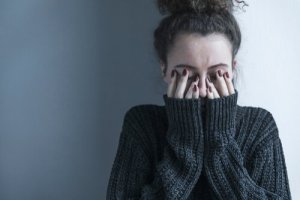Five Habits of People who Hide Their Depression

Hidden depression is a condition when the sufferer doesn’t manifest typical symptoms of depression, but instead other patterns and traits under which they hide it. In fact, the first to overlook this situation is the one who’s suffering from it. They do so to push their pain to the back burner.
This process of trying to encapsulate or beautify their symptoms of depression is unconscious or preconscious. It’s not that the person deliberately wants to pretend to not be feeling something. Concealment is a way of defending themselves from the pain that perhaps they don’t feel capable of dealing with.
Hiding one’s problems from oneself and others isn’t positive at all. On the contrary, sometimes this only makes problems worse. Here are five telltale signs that a person has hidden depression:
1. They’re obsessively sociable
People with hidden depression don’t want to be alone because they don’t like spending time by themselves. If they don’t have people around them, their acute feelings of sadness surface more easily.
This is the reason why they tend to be obsessively sociable. They’re always looking for ways to organize get-togethers and other social events. And if they don’t succeed, then they simply call their relatives, friend, or colleagues. Subsequently, they don’t want to be alone because solitude forces them to think.

2. Overly emphasize their well-being
This exaggerated behavior is usually an attempt to compensate for the fact that they feel completely awful. People with hidden depression tend to boast about their supposed wellness. If you ask them how they are, they won’t say good but instead “great” or “fantastic”.
As we noted, this is an unconscious form of compensation. Not only that, but it’s almost an attempt to convince themselves and others of how “wonderful” they feel. It’s a smokescreen to ward off their discomfort and keep their depression at bay.
3. They talk repeatedly about the past
In hidden depression, as in any form of depression, the past plays a leading role. That’s why people with hidden depression often talk about past issues with others. Although they may refer to these issues jokingly, they do it frequently.
Failure to leave the past in the past is an indicator that they have unresolved issues. That past could have been positive or negative, it doesn’t matter. The thing is that they keep reliving what they already experienced every time they talk about it. They’re strongly attached to their past and haven’t been able to let go of it.
4. Eating disorders
These disorders are always indicators of some sort of emotional discomfort, especially if the changes in appetite are not transient, but permanent, and even become more apparent as time goes by. These habits may be eating less than normal, more than normal, or eating in an anarchical way.
Sometimes, people with hidden depression don’t stop eating nor eat more, but instead show disgust for certain foods or have frequent digestive problems. Some people with hidden depression also become obsessed with eating something in particular or eating in a certain way.

5. They can’t sleep peacefully
As with eating, people with hidden depression present sleep anomalies that could manifest in different ways. Usually, they either don’t sleep enough or sleep too much.
Occasionally, other behaviors such as becoming nocturnal, difficulty sleeping in a bed in a horizontal position, and having intermittent dreams manifest.
All these indicators must be evaluated carefully. Depression is more than a state of sadness or disguised denial. Thus, it’s a condition that must be evaluated by well-trained professionals.
Hidden depression is a condition when the sufferer doesn’t manifest typical symptoms of depression, but instead other patterns and traits under which they hide it. In fact, the first to overlook this situation is the one who’s suffering from it. They do so to push their pain to the back burner.
This process of trying to encapsulate or beautify their symptoms of depression is unconscious or preconscious. It’s not that the person deliberately wants to pretend to not be feeling something. Concealment is a way of defending themselves from the pain that perhaps they don’t feel capable of dealing with.
Hiding one’s problems from oneself and others isn’t positive at all. On the contrary, sometimes this only makes problems worse. Here are five telltale signs that a person has hidden depression:
1. They’re obsessively sociable
People with hidden depression don’t want to be alone because they don’t like spending time by themselves. If they don’t have people around them, their acute feelings of sadness surface more easily.
This is the reason why they tend to be obsessively sociable. They’re always looking for ways to organize get-togethers and other social events. And if they don’t succeed, then they simply call their relatives, friend, or colleagues. Subsequently, they don’t want to be alone because solitude forces them to think.

2. Overly emphasize their well-being
This exaggerated behavior is usually an attempt to compensate for the fact that they feel completely awful. People with hidden depression tend to boast about their supposed wellness. If you ask them how they are, they won’t say good but instead “great” or “fantastic”.
As we noted, this is an unconscious form of compensation. Not only that, but it’s almost an attempt to convince themselves and others of how “wonderful” they feel. It’s a smokescreen to ward off their discomfort and keep their depression at bay.
3. They talk repeatedly about the past
In hidden depression, as in any form of depression, the past plays a leading role. That’s why people with hidden depression often talk about past issues with others. Although they may refer to these issues jokingly, they do it frequently.
Failure to leave the past in the past is an indicator that they have unresolved issues. That past could have been positive or negative, it doesn’t matter. The thing is that they keep reliving what they already experienced every time they talk about it. They’re strongly attached to their past and haven’t been able to let go of it.
4. Eating disorders
These disorders are always indicators of some sort of emotional discomfort, especially if the changes in appetite are not transient, but permanent, and even become more apparent as time goes by. These habits may be eating less than normal, more than normal, or eating in an anarchical way.
Sometimes, people with hidden depression don’t stop eating nor eat more, but instead show disgust for certain foods or have frequent digestive problems. Some people with hidden depression also become obsessed with eating something in particular or eating in a certain way.

5. They can’t sleep peacefully
As with eating, people with hidden depression present sleep anomalies that could manifest in different ways. Usually, they either don’t sleep enough or sleep too much.
Occasionally, other behaviors such as becoming nocturnal, difficulty sleeping in a bed in a horizontal position, and having intermittent dreams manifest.
All these indicators must be evaluated carefully. Depression is more than a state of sadness or disguised denial. Thus, it’s a condition that must be evaluated by well-trained professionals.
All cited sources were thoroughly reviewed by our team to ensure their quality, reliability, currency, and validity. The bibliography of this article was considered reliable and of academic or scientific accuracy.
- Lidice, J., Valdés, Y., Quevedo, C., & Torres, V. (2007). Depresión oculta en sujetos que laboran en condiciones complejas. Rev Cubana Med Milit, 36(2), 1-6.
This text is provided for informational purposes only and does not replace consultation with a professional. If in doubt, consult your specialist.







